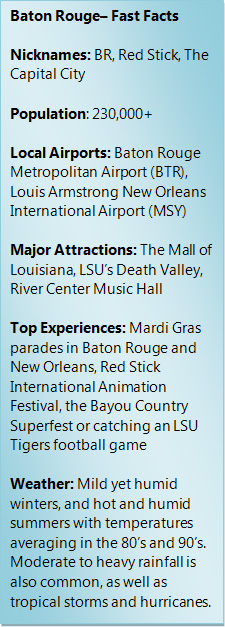 A city immersed in school spirit and French-rooted culture, Baton Rouge can be much more than an old plantation lands turned residential areas and college towns.
A city immersed in school spirit and French-rooted culture, Baton Rouge can be much more than an old plantation lands turned residential areas and college towns.
If you're relocating as a college student, a small or large family, or just because you're curious to see what the south is all about, let this guide full of useful information and tips help assist you as you consider calling Baton Rouge your new home.
Baton Rouge Climate
The weather in Baton Rouge is generally humid year round with a subtropical climate. Winters are mild and short-lived, ranging from the low 40's to low 60's, but with a significant amount of humidity. The summers are hot and humid, with highs averaging in the 90's, and the city has moderate to heavy rainfall all year.
The area is also prone to hurricanes and tropical storms because of its proximity to the coastline. The most recent was Hurricane Gustav in 2008 - the worst hurricane to reach the Baton Rouge area with 100 mph winds that knocked down large amounts of power lines.
Baton Rouge Neighborhoods
Downtown Baton Rouge is the area's central business district, but beyond that, there are many smaller historic neighborhoods that make up the city of Baton Rouge, including Spanish Town, which dates back to the Civil War and has the city's largest Mardi Gras parade, and the historic Garden District in Mid-City with many upscale homes.
Locals say to avoid areas like Gardere and North Baton Rouge because of potential crime.
For the college student, the LSU/Lakeshore area is home to LSU's main campus, and encompasses University Hills, University Gardens, College Town, State Street and other areas. You'll find many college students and locals jogging or biking around Lakeshore.
Registering Your Car
If you're a new resident to the state of Louisiana, you have 30 days to switch your out-of-state driver's license to a Louisiana driver's license. You must, in person, go to your local Office of Motor Vehicles to apply. You will need your current valid driver's license, proof of insurance if you own a vehicle, Social Security Card, and proof of address. The Class E cost is $24.50 and does not include any individual parish fees that may exist. Your registration must also be updated within 30 days of residency. For more information, visit: OMV's policy and procedure.
Baton Rouge Schools
East Baton Rouge Parish Public Schools operates primary and secondary education in the city, with over 90 schools and has 15 charter schools in the area.
For higher education, Baton Rouge claims Louisiana State University with a main campus, nine senior colleges and three schools, comprising a 32,000-student enrollment. Southern University and A&M College, Southeastern Louisiana University, Virginia College, Our Lady of the Lake College and Baton Rouge Community College are also located in the city, with Tulane University close by in New Orleans.
Baton Rouge Employment
The economy in Baton Rouge is centralized around the petrochemical industry with producing and manufacturing, maintaining a strong economy in comparison to national trends. In fact, Baton Rouge averaged around a 6 percent unemployment rate as of December 2012. ExxonMobil holds its facility in the city, and is the second largest oil refinery in the country and employs over 4,000 people.
The largest employer is the Louisiana State Government, which has over 25,000 employees. Baton Rouge has a number of research hospitals that have steadily increased job numbers, as well as an up-an-coming film industry thanks to the draw to neighboring New Orleans and state tax incentives.
Living Costs in the City
The overall cost of living in Baton Rouge is approximately 7 percent lower than the national average, with home prices averaging at about $150,000. Because it is mainly a college town, apartment rates will vary and tend to be higher closer to campus, but a one-bedroom apartment can range between $600-$900. The average salary in Baton Rouge is between $35,000-$40,000.
Electric bills will be higher in the summer due to the hot weather, and you'll most likely have hurricane offset charges from bonds sold to pay for storm damage.
Since Louisiana is dependent on big oil, you'll pay about $0.20 lower on average at the gas pump, but you'll have to do a lot more driving than in cities where public transportation is more prominent.
Baton Rouge Moving Resources
Moving and storage companies are ready and willing to help you with your move to Baton Rouge, whether you're moving from out of state or from another county in Louisiana. Make sure you get estimates from multiple moving services before you commit to hiring any (at least three estimates). Check back to our guides for tips on how to choose your moving service wisely with important questions to ask, differentiating between types of estimates, and mistakes to avoid. Visit the following pages at Movers.com to get quotes for the following services:
Baton Rouge Transportation
 Being a major city in Louisiana, Baton Rouge is connected by some main interstates and local roads. Major routes include Interstate 10, Interstate 12, Interstate 110, US 61 (Airline Highway) and US 190 (Florida Boulevard) via the Huey P. Long Bridge, a truss cantilever bridge over the Mississippi River. There's also LA 37, LA 67, LA 42, LA 30, LA 73, LA 1 and LA 19.
Being a major city in Louisiana, Baton Rouge is connected by some main interstates and local roads. Major routes include Interstate 10, Interstate 12, Interstate 110, US 61 (Airline Highway) and US 190 (Florida Boulevard) via the Huey P. Long Bridge, a truss cantilever bridge over the Mississippi River. There's also LA 37, LA 67, LA 42, LA 30, LA 73, LA 1 and LA 19.
With limited public transportation, traffic is heavy and almost 100 percent of Baton Rouge's workforce uses a personal vehicle to commute to work using I-10 and I-12. Capital Area Transit System provides transportation throughout Baton Rogue, serving Southern University, Baton Rouge Community College, and Louisiana State University.
Culture & Contemporary Life
The Great Expulsion of 1755 caused over 11,000 Acadians from Acadia (a colony in North America that included parts of Quebec and Maine) to settle in areas around Baton Rouge, and they would eventually call themselves "Cajuns" - a term used today to describe the southern Louisiana culture infused with French origins and a distinct Cajun French dialect.
Cajun cuisine in the area is also one-of-a-kind, most known for its flavorful array of seafood from the Gulf of Mexico like shrimp, oysters and crawfish, generally boiled in a mix of intense spices.
College and NFL football also takes front seat in Baton Rouge's culture. The Louisiana State University's Tigers have won multiple national football championships and Southeastern Conference championships, and have play at Tiger Stadium with capacity of 92,542. The stadium, known to the locals as "Death Valley," is the 16th largest stadium in the world by capacity, and is unsurpassed for Saturday night football atmosphere, according to ESPN, and boasts being the most difficult place for an opposing team to play.
You'll also find avid New Orleans Saints fans in Baton Rouge as well, as both Tiger and Saints memorabilia is displayed all over the city. And in keeping with the Cajun culture, you'll find south Louisiana distinctively displays "Geaux Tigers/Saints" or instead of "Go Tigers/Saints."
Baton Rouge Relocation Tips
- If you're moving on a budget, and don't want to hire movers to help unpack your things, enlist some of your new neighbors. Locals are generally very friendly and inviting, and are usually willing to lend a free hand.
- There are a lot of jobs in Baton Rouge, but many are field-specific. Do some research before you move and make sure you have plenty of options in your field
- Prepare for hurricanes with non-perishables, water, flashlights, batteries, etc. Louisiana offers a sales tax holiday right before the beginning of hurricane season for such items. Also be aware that many people evacuate to Baton Rouge from more southern regions of the state in the event of a hurricane.